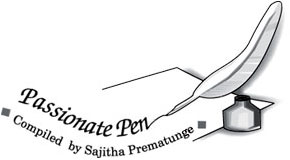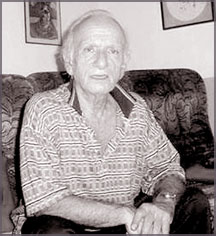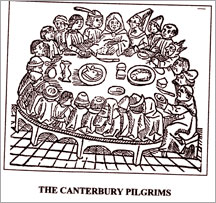
[email protected]
35, D.R. Wijewardene Mawatha, Colombo 10.
Tennyson said of Chaucer...
 by Carl Muller by Carl Muller
"Dan Chaucer, the first warbler, whose sweet breath
Precluded those melodious bursts that fill
The spacious times of great Elizabeth
With sounds that echo still."
Yes Chaucer really broke the ice and gave English its place as the
language of the people. Dryden described him as 'a perpetual fountain of
good sense" and Edmund Spenser praised him with his lines:
"Dan Chaucer, well of English undefiled,
On fame's eternal bedroll, worthy to be filed."
Chaucer spent much of his youth and early manhood in France, much of
his middle life in Italy, and his latter days in England. I will not
gainsay that there was much French influence in his first works. These
included The Romaunt of the Rose, The Complaint to Pity, The Book of the
Duchess and some minor poems. All were French in form and directly
translated, even imitated from the French.

His second phase of work [Troilus and Criseyde, The Knight's Tale and
The Legend of Good Women] has much that he owed to his Italian
contemporaries. Then came his greatest work that was thoroughly English
- The Prologue" to the Canterbury Tales, and a large share of the Tales
themselves.
We find in these three groups of his works, his progress from an
imitator of the French to his borrowings from the Italian, and finally
his "English Period" that not only made him a consummate poet but also
inspired him to originality in manner and presentation that led Dryden
to exclaim. "Here is God's plenty!".
Taking the "Canterbury Tales" you will find that the versification is
perfect even if his system of pronunciation needs to be understood. We
must remember that Chaucer was using the English of his day and truly,
of his mind. To help readers [and who would scorn reading the
"Canterbury Tales"? ] I would like to give some explanation of Chaucer's
English.
Swich - Such
Vertu - Strength, or Life
Holt - Wood [this is chiefly from the German Holz ]
Corages - Hearts
Esed - Entertained
Crulle - Curly
Mede - Meadow
Endyte - Recite
Purtreye - Draw [Portray]
Nightertale - Night time
Bracer - Covering
Disport - Mirth
Yerde - Stick
Streit - Strict
Swinken - Work
Lust - Pleasure
Purfiled - Trimmed
Grys - Fur
Solempne - Pompous
Pituance - Gift
Yeddinges - Ballads
Tappestere - Bartender [later we had tapman]
Avaunce - Profit
Poraille - Poor people
Cope - Cape.
Oh, there's so much more but I will stop at the few given here. I am
sure we choose to read Chaucer in modern translation, but the Tales,
when they first appeared, filled readers with delight and admiration.
Chaucer himself was on a pilgrimage to the shrine of Thomas a Becket
at Canterbury and, when in Southwark, met a mixed company of pilgrims at
the Tabard Inn - true-to-life characters and all of the middle classes.
We find no beggars, no lords or ladies. The three women are the
Prioress, her attendant nun and the wife of Bath.
The men are the Knight and his son, the young Squire, the Clerk of
Oxenford, the Sergeant of the Law and the Doctor. There are also
countrymen: the Frankelyn the Plowman and the Reve, and of the Church
there are the Monk, the Friar, the Nun's Priest, the Parson, the Somnour
and the Pardoner. Chaucer also includes a Shipman and a Cook, among
others.
I give you an illustration of these Canterbury pilgrims that appeared
in the second edition of the "Tales" printed by Caxton circa 1488.
It is said that Chaucer probably borrowed the idea for the Tales from
some Italian writers who inspired Boccaccio to model his famous "Decameron"
. Chaucer gave us 24 stories [17,325 lines] and did not complete the
full quota of 136 tales told by 34 persons.
Trying to transplant Chaucer's English from its quaint medieval soil
into our modern speech destroys the subtle charm of his lines. Dryden,
Pope and Wordsworth tried to do so, skilfully and lovingly, but without
much success.
I am reminded of Emerson who was so charmed by the beauty of the
shells he found on the seashore that he gathered a few to take home with
him. But he had reason to lament his action:
"I fetched the seaborn treasures home,
But the poor, unsightly, noisome things
Had left their beauty on the shore
With the wind and the waves and the wild uproar."
So you see...... we had best leave the beauty of Chaucer to Chaucer! |
